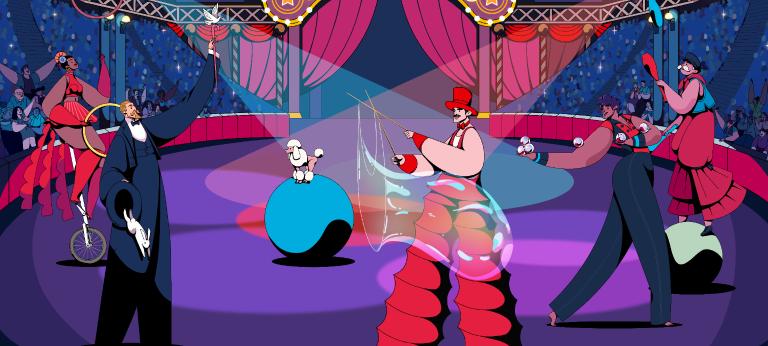The circus of transformation
![{[downloads[language].preview]}](https://www.rolandberger.com/publications/publication_image/ta41_en_cover_download_preview.jpg)
Think:Act Magazine features experts and authors on topics including company reinventions, ethical business, resilience and innovation strategies.



by Anthony Myers
James Cadbury, CEO of Love Cocoa, a disruptor brand that promises to produce chocolate in a more sustainable and ethical way, has a history with the industry. Although he can trade on his illustrious name, it's his vision for the future of confectionery that is the most compelling aspect of his quest for a better bar.
James Cadbury first became aware of his family heritage as a child when he would see Cadbury Dairy Milk bars displayed on sweet shop counters. Yet despite the legendary name, he was far from being a shoo-in as heir to the family fortune. "As Quakers, they thought everybody should start afresh. A lot of people think I could just go to the factory and they would tell me what to do – and that I have loads of money. It's actually the opposite," Cadbury says. In 2016, Cadbury quit a career in finance in order to found his own chocolate company called Love Cocoa. "When I started, I had no idea how to make chocolate," he freely admits. His initial idea to ship premium chocolate gifts that come in a slender envelope and not a bulky box has since grown into a quest for a better bar, emulating the innovative and ethical principles of his forefathers.

James Cadbury's great-great-great-grandfather John Cadbury and his son George practically invented the chocolate bar when, in 1850, George purchased a cocoa press from The Netherlands. The company went from being a small UK manufacturer to one of the world's most famous chocolate brands. It was independently owned until 2010, when it was swallowed by the multinational food giant Kraft, later Mondelēz International. "I think the backbone, and things I learned from my family's legacy, was innovation and treating your staff well," says the 37-year-old.
Using personal savings and a startup loan of $30,000 from Virgin Bank, Cadbury left his life in London's financial district to set up his own brand. Love Cocoa bars are handmade in London with a variety of unusual flavors, including gin and tonic, rose and pistachio, strawberry champagne and dark chocolate and avocado. In recent years, the bars have racked up critical acclaim and several awards.
Making chocolate can be a dirty business. Farmers in Côte d'Ivoire, which accounts for more than 40% of the world's cocoa beans, often live on less than one dollar a day, according to the World Economic Forum. Poverty leads to child labor and causes farmers to expand into protected areas, exacerbating environmental problems.
Since the signing of an international public-private agreement called the Harkin-Engel Protocol in 2001, the cocoa industry has been striving to clean up its supply chain, but problems persist.
Since mid-2023, large chocolate companies and cocoa suppliers must ensure full traceability in their supply chains, driven by new European Union legislation that prohibits imports of any commodities originating from protected forests. Corporations are therefore using satellite technology and mapping tools to comply. Chocolate and cocoa companies also work directly with farmers and cooperatives and are increasingly investing in agroforestry management to help growers continue toward diversifying their crops.
As the young CEO of a new company, Cadbury's first test was steering through the pandemic, when he took the decision to retain his staff and concentrate on the direct-to-consumer business. In early 2023, he secured almost $5 million in capital from Richard Koch, the author and entrepreneur behind venture successes such as the British coffee chain Grind, Plymouth Gin and the online betting company Betfair.
In just a little over seven years, Love Cocoa has gone from a one-man operation to a staff of 19 with revenues of $6.4 million. In 2020, Cadbury launched his second brand, H!P Chocolate, to tap into the growing vegan trend. The entrepreneur was one of the first to use oat milk in chocolate and managed to give the product the same creamy taste and texture as the original. Previously, rice or coconut milk had served as dairy substitutes, but in many critics' and consumers' minds tasted too sweet and didn't have the mouthfeel of traditional chocolate. Development of the new vegan bar took 12 months, Cadbury recounts, until he was satisfied that the product ticked all the taste boxes, as well as fulfilled his requirements around health and environmental aspects.

Both brands pursue different goals. Love Cocoa was the launch pad to help Cadbury take a stab at transforming the cocoa sector. Its supply chain has changed little from his ancestors' time and to this day struggles with a colonial legacy of farmer poverty, particularly in West Africa. H!P Chocolate, for its part, is gaining significant traction as an environmentally conscious, milk-free alternative, especially after securing a listing in Sainsbury's supermarkets in the UK in 2022.
Cadbury brings a strong set of ethical values to both brands, which have a reputation for plastic-free packaging, sustainably sourced, "slave-free" cocoa and their commitment to combating deforestation and climate change. The company became B Corp-certified in June 2023, which it describes as a "massive milestone." Love Cocoa's eco credentials have been enhanced by its "One Bar = One Tree" campaign, an initiative that aims to plant 500,000 trees in northern Cameroon. While many chocolate companies certify their sustainability efforts internally, the campaign's progress will be independently verified. Cadbury emphasizes that it was crucial to find a cocoa supplier with a transparent supply chain without any trace of child labor or deforestation abuses, which also pays its farmers a living wage.
For Cadbury, sustainability and human rights are baked into Love Cocoa's DNA. "I knew it had to be ethical and sustainable to draw on inspiration from my great-great-great-grandfather. They stopped working with suppliers off an island called São Tomé because of slavery links. It was important that we found a really good supplier." He says he found such a source in Luker Chocolate, based in Colombia. The company guarantees 100% sustainability in its supply chain before the beans are shipped to Europe. Because Cadbury is a relatively small player in a market valued at $11.23 billion in 2021, this gives Love Cocoa an advantage over the multinational companies that source their cocoa mainly from West Africa where abuses of human rights and the environment are harder to eradicate.

With his sights set on growing both brands, Cadbury expects Love Cocoa to turn a profit in the next couple of years. "Our longer-term ambition is for an IPO in five, six or seven years. I imagine it will be on a small exchange," he says. Indeed market watchers are closely following how Cadbury is trying to expand his small niche amongst giants. "Love Cocoa has swiftly made its mark on the UK's premium chocolate confectionery segment in the past few years," says Neill Barston with trade publication Confectionery Production. "The next major challenge comes as it moves into the fiercely competitive brand-led retail arena. It's the ultimate test in growing the business to the next level."
Validating Cadbury's business instincts, larger chocolate companies are clamoring to get in on the vegan trend and emulate brands like H!P Chocolate. Lindt, for instance, launched an oat milk chocolate bar in 2022. This raises the question of whether one of the bigger brands might make an offer for H!P. Would Cadbury sell, especially considering the bad taste left in the mouth from the Cadbury brand takeover by Mondelēz International? The chocolate heir remains cautious. "If I can grow it as big as I can without that, then that would be my number one priority. But at some stage, to get further investment from outside, it could be an interesting discussion to have."

![{[downloads[language].preview]}](https://www.rolandberger.com/publications/publication_image/ta41_en_cover_download_preview.jpg)
Think:Act Magazine features experts and authors on topics including company reinventions, ethical business, resilience and innovation strategies.
